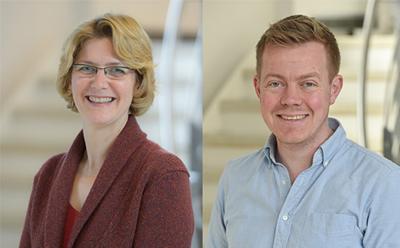Chemistry lecturers praised for pastoral support in Southampton academic awards

Students at the University of Southampton have honoured two chemistry lecturers for going the extra mile in their teaching in the students’ union Academic Awards.
Physical and Inorganic Chemistry lecturer Professor Andrea Russell was recognised for Best Pastoral Support in the Faculty of Engineering and Physical Sciences, with Inorganic Chemistry Teaching Fellow Dr Paul Duckmanton Highly Commended in the same category.
Chemistry School President Hannah Watson was celebrated for Best Contribution to the Faculty in the annual prizegiving, which selected its winners from over 500 nominations across the university.
Andrea’s citation in the virtual University of Southampton Students’ Union (SUSU) ceremony highlighted her willingness to ‘provide extra support by talking to students after class for prolonged times about academic but also personal matters’.
“I am really pleased to be recognised for my pastoral support activities,” she says. “Our students are why I love my job. Some of my most precious memories of my career so far are the times I’ve watched a student who I know overcame some personal issue walk across the stage at graduation to collect their degree.
“Pastoral support is integral to our degree programmes. As with most other programmes, each student is assigned a personal tutor. However, our students are able to seek assistance from any member of staff. By having a shared common room and strategically positioning breakout tables for group working along the paths most travelled by staff, our students have easy access to staff and rapidly learn that most of us are approachable and want to help.
“This openness and availability of staff is really important to the ethos of the School of Chemistry. In my view it is important that as a student goes from their pre-university/A-level course through their university studies that they increasingly see the staff as collaborators in the intellectual experience and our approach to pastoral support helps in this transition.”
Andrea lectures on equilibria, electrochemistry, and atomic structure and bonding. In addition, she teaches mathematics for Chemistry students who do not have A-level maths and teamworking. At postgraduate level she contributes to the electrochemistry modules and the Southampton Electrochemistry Summer Schools, both in the UK and abroad.
For Southampton’s growing
Chemical Engineering
programme, Andrea will be contributing to the physical chemistry aspects of the Principles of Chemical Engineering module in the first year and the second year practical module on unit operations and chemical analysis.
Dr Paul Duckmanton supports undergraduate inorganic chemistry in both a direct and supporting role, along with being the chemistry placement coordinator.
“I always feel honoured being recognised by SUSU for the work I do – it shows the students appreciate what I’m doing,” he says. “Pastoral support is very important to me, as I feel supporting students with the bumps in life means they can concentrate on getting the most out their studies and university experience.”
The SUSU awards celebrated several Academic Reps that mediate between staff and students to help improve academic experience.
Hannah Watson has served Chemistry School President since July 2019 and has championed much change in her school through activities including the Staff Student Liaison Committee. Her SUSU prize citation praised her professionalism but also her ‘caring and thoughtful’ personality.
“I would like to say a huge thank you to the truly wonderful School of Chemistry students who nominated me,” she says. “I hope that students will benefit from our programme restructure, giving them a more balanced workload and better lab teaching across their degree. I also hope that students felt they had the opportunity to ask their questions and feedback to us during the coronavirus pandemic, to help improve the online offering and understand decisions made.
“I'm looking forward to seeing students enrol on our new Chemical Engineering programmes in the near future and for Chemistry students to benefit from interactions with these students and new academic staff members.”